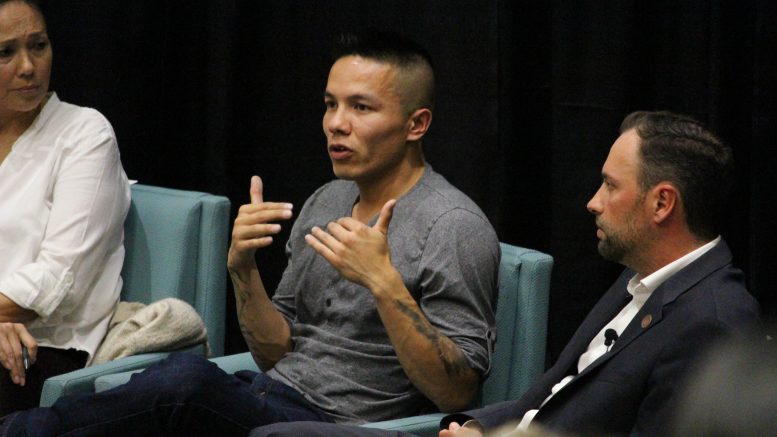More than a year after the Truth and Reconciliation Commission of Canada (TRC) issued 94 calls to action, discussions toward what reconciliation looks like – and how it can be achieved – continue.
The University of Manitoba faced the subject with the opening of its 2016-17 Visionary Conversations series on Sept. 21, hosting a four-member panel discussion examining how to move from theory to action in reconciliation.
The panel included Manitoba NDP MLA for St. Johns Nahanni Fontaine; Winnipeg-based film producer and former Churchill member of Parliament Tina Keeper; CBC Indigenous producer and Red Rising Magazine co-founder Lenard Monkman; and National Centre for Truth and Reconciliation (NCTR) director Ry Moran.
A crowd of students, academics, and community members at-large filled the Robert Schultz Theatre to participate in a dialogue about how Canada can effectively address its Indian residential school past.
Over its six-year mandate, the TRC heard more than 6,700 residential school survivor and witness statements. It released 94 calls to action in June 2015. Its final report was released in December.
For more than 100 years, indigenous children were removed from their home communities and schooled and assimilated in government-funded, church-run institutions before the final school closed in 1996. Reports of physical and sexual abuse at the schools are common.
In opening remarks, all four panelists acknowledged that reconciliation takes many different shapes. Monkman remarked that if 100 people were polled on the street, they would return as many different visions for how to move forward.
“What does real reconciliation look like if First Nation values clash with capitalism, with resource extraction, with the understanding of how important water is?” asked Monkman. “We have all of these different conversations about reconciliation.”
However, all agreed education is a key step toward instilling the next generation with the tools and confidence to face Canada’s residential school history.
“The truth is that we have been through an extraordinary cultural genocide and we have endured, through many generations, a massive, massive amount of trauma which we know and identify as historic trauma,” said Keeper.
As director of the NCTR, which opened its doors on the U of M’s Fort Garry campus in the summer of 2015, Moran is overseeing the creation of a national archive and permanent home to all statements, documents, and materials gathered by the TRC.
He noted the commission’s calls to action provide a roadmap but are not the solution, saying Canadian indigenous communities are still in crisis.
“Just because we’ve had an apology and just because we’ve had a truth commission, [that] doesn’t mean that that crisis has stopped,” he said.
“We as a society – as a collective, mainstream Canadian society – really need to come to terms with what this history means,” he added.
Beyond education, Monkman also called on the federal government to refrain from engaging in drawn-out court battles with First Nations concerning land use and resource planning.
“Reconciliation needs Canada to stop fighting First Nations people,” he said.
“Maybe give us back ten per cent of the land. Maybe real self-government will happen. Maybe we’ll be able to determine what is going to happen. We’ll be able to determine what our politics is going to look like. We’ll be able to determine what our education system is going to look like.”
Joe Keeper, Tina’s father and a community elder who identified himself as a survivor, told the panel and gathered crowd that the systemic racism of the residential school system extends beyond the schools themselves and into society as a whole.
That, he said, is what makes the past so difficult to face.
“When you go back and you try and isolate why things are the way they are today, it’s well-named, truth and reconciliation, but the more difficult thing is coming to grips with the truth,” he said.
“And until we come to grips with the truth, it’s going to be hard to reconcile.”




